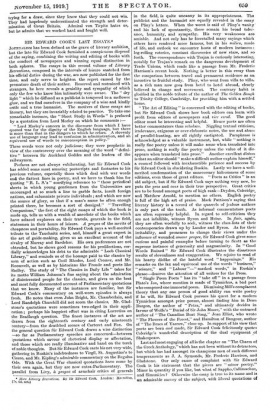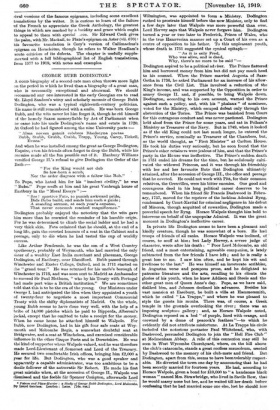SIR EDWARD COOK'S LAST ESSAYS.*
JOURNALTSM has been defined as the grave of literary ambition, but the late Sir Edward Cook furnished a conspicuous disproof of the saying, combining the writing and editing of books with the conduct of newspapers and winning equal distinction in
both spheres. The essays in this second volume of Literary Recreations, composed in the intervals of leisure snatched from his official duties during the war, are now published for the first time, and only serve to heighten the regret caused by the premature death of their author. Reserved and restrained with strangers, he hero reveals a geniality and sympathy of which only the few who knew him intimately were aware. The "dry light" which he diffused as a publicist is tempered to a mellower glow, and we find ourselves in the company of a wise and kindly critic and a true humanist. The motives of these essays are literary, but they are invariably related to practice. To take one
remarkable instance, the "Short Study in Words" is prefaced by a quotation from Lord Morley on which he comments :— " Lord Morley's concern in the discourse from which I have quoted was for the dignity of the English language, but there is more than that in the dangers to which he refers. A slovenly use of language may lead to confusion in administration, and an equivocal use of words to misconception in policy."
These words were not only judicious; they were prophetic in view of the controversy over the meaning of the word " defini- tive " between Sir Auckland Geddes and the leaders of the railwaymen.
Prefaces are not always exhilarating, but Sir Edward Cook has added some most amusing postscripts and footnotes to his previous volume, especially those which deal with war words and the flattest lines in poetry, and we have to thank him for quoting "R. L S.'s " scarifying reference to "those periodical sheets in which young gentlemen from the Universities are encouraged at so much a line to garble facts, insult foreign nations, and calumniate private individuals ; and which are now the source of glory, so that if a man's name be often enough printed there, he becomes a sort of demigod." "Travelling Companions," the first of the eight essays of which the book is made up, tells us with a wealth of anecdote of the books which have solaced explorers on their travels, generals in the field, statesmen in their hours of leisure. A propos of the merits of
cheapness and portability, Sir Edward Cook pays a well-merited tribute to the Tauchnitz series, and, himself a great expert in the art of guide-making, gives us an excellent account of the
rivalry of Murray and Baedeker. His own preferences are not obtruded, but be shows good reasons for his predilections, cor- dially acknowledges his debt to the admirable "Loeb Classical Library," and reminds us of the homage paid to the classics by men of action such as Cecil Rhodes, Lord Cromer, and Mr. Roosevelt, as well as by historians like Froude and poets like Shelley. The study of "The Classics in Daily Life" takes for its motto William Johnson's fine saying about the admiration of disinterested people for the classics, and gives us the best and most fully documented account of Parliamentary quotations that we know. Many of the instances are familiar, but Sir Edward Cook's commentary on well-worn episodes is always fresh. He notes that even John Bright, Mr. Chamberlain, and Lord Randolph Churchill did not scorn the classics. Mr. Glad.
stone's quotations were sometimes two-edged in their appli- cation; perhaps his happiest effort was in citing Lucretius on the Bradlaugh question. The finest instances of the art are drawn from the eighteenth century and early nineteenth century—from the deathbed scenes of Carteret and Fox. On the general question Sir Edward Cook draws a wise distinction —so far as Parliamentary speeches are concerned—between quotations which savour of rhetorical display or affectation, and those which are really illuminative and hand on the torch of noble thoughts. But Sir Edward Cook casts his net very wide, gathering in Ruskin's indebtedness to Virgil, St. Augustine's to Cicero, and Mr. Kipling's admirable commentary on the Regulus Ode. With the Great War classical quotations have come by their own again, but they are now extra-Parliamentary. The parallel from Livy, a propos of armchair critics of generals
• More Literary Recreation;. By Sir Edward Cook. London: Macmillan. (70. W. nct.1 in the field, is quite uncanny in its appropriateness. The publicist and the humanist are equally revealed in the essay on Pliny's letters. When the worst is said of Pliny's vanity • and his lack of spontaneity, there remain his broad toler- ance, humanity, and sympathy. His very weaknesses are amiable. And not only has he forestalled many sayings which others have rendered more famous, but in his milieu, mode of life, and outlook we encounter hosts of modern instances : log-rolling coteries, constant discoveries of new stars, and so forth. The correspondence with Trojan is curiously interesting, notably for Trajan's remark on the dangerous development of Trade Unions, which reads like a passage from Mr. Frederic Harrison's recent book. Nothing is better in this essay than the comparison between travel and permanent residence as an incentive to fruitful study. Pliny, who went from villa to villa, as a rich man now goes from hotel to hotel abroad, clearly believed in change and movement. The contrary habit is glorified in the noble tribute of the author of The Golden Bough to Trinity College, Cambridge, for providing him with a settled home.
The Art of Editing" is concerned with the editing of books, but Sir Edward Cook shows how book editors can learn with profit from editors of newspapers and vice verse'. The good editor must be interesting and helpful. Hence poets are often better commentators than scholars. Niggling textual criticism, irrelevance, exiguous or over-elaborate notes, the use and abuse of parallel-hunting, are all rightly castigated. Paraphrase is acknowledged as a valuable instrument, but, while "nothing is really fine poetry unless it will make sense when translated into prose, nothing is really fine poetry unless the value of it dis- appears when translated into prose." Another excellent didum is that an editor should "make a difficult author explain himself," a counsel followed with inexhaustible patience and success by Sir Edward Cook in elucidating Ruskin. Lastly wo have a well- merited condemnation of the unnecessary hideousness of some editions, even those of great editors. "Poets as Critics" is an old subject, but if Sir Edward Cook says nothing very new, he puts the pros and cons in their true perspective. Great critics are to be found amongst poets of high rank—Dryden, Coleridge, and Matthew Arnold, to mention no others. English poetry is full of the high art of praise. Mark Pattison's saying that literary history is a record of the quarrels of jealous authors is only part of the truth. As informal commentators poets are often supremely helpful. In regard to self-criticism they are not infallible, witness Byron and Heine. In flair, again, they are often woefully to seek, witness the class-lists of their contemporaries drawn up by Landor and Byron. As for their irritability, and proneness to change their views under the influence of wounded amour propre, Sir Edward Cook gives some curious and painful examples before turning to Scott as the supreme instance of generosity and magnanimity. In "Good Words Ruined" Sir Edward Cook illustrates the disastrous results of slovenliness and exaggeration. We rejoice to read of his hearty dislike of the hateful word "happenings." His remarks on the lax and equivocal use of the words "business," "science," and "Labour "—" masked words," in Ruskin's phrase—deserve the attention of all writers for the Press.
"Single Poem Poets" has its "take off" in a passage from Plato's Ion, where mention is made of Tynnichus, a bad poet who composed one immortal poem. Dismissing Mill's complacent theory that any one person of good ability can write poetry if he will, Sir Edward Cook pursues his quest for a modern Tynnichus amongst prize poems, almost finding him in Dean Burgon, the author of "Petra," and ultimately decides in favour of Wolfe's "Burial of Sir John Moore," with the untraced author of "The Canadian Boat Song," Jean Elliot, who wrote "The Flowers of the Forest," and Hamilton of Bangour, author of "The Braes of Yarrow," close up. In support of his view that poets are born and made, Sir Edward Cook felicitously quotes Coleridge's wonderful description of the dual equipment of Shakespeare.
Last and most engaging of all is the chapter on "The Charm of the Greek Anthology," which has not been without its detractors, but which has had amongst its champions men of such different temperaments as J. A. Symonds, Mr. Frederic Harrison, and Gladstone. Our only cause of complaint with Sir Edward Cook is his statement that the pieces are "minor poetry." Minor in quantity if you like, but what of Sappho, Callimachus, and Simonides ? Otherwise the essay is true to its name and is an admirable survey of the subject, with liberal quotations oi rival versions of the famous epigrams, including some excellent translations by the writer. It is curious to learn of the failure of the French to appreciate the Greek Anthology, the greatest things in which are marked by a lucidity and grace which ought to appeal to them with special ,ree. Sir Edward Cook gives the palm, with Mr. Mackail, to Plato's epigram on Aster (vii. 670) : his favourite translation is Cory's version of Callimachus's epigram on Heracleitus, though he refers to Walter Headlam's acute criticism of its defects. The chapter is usefully supple- merted with a full bibliographical list of English translations, from 1577 to 1919, with notes and examples.







































 Previous page
Previous page